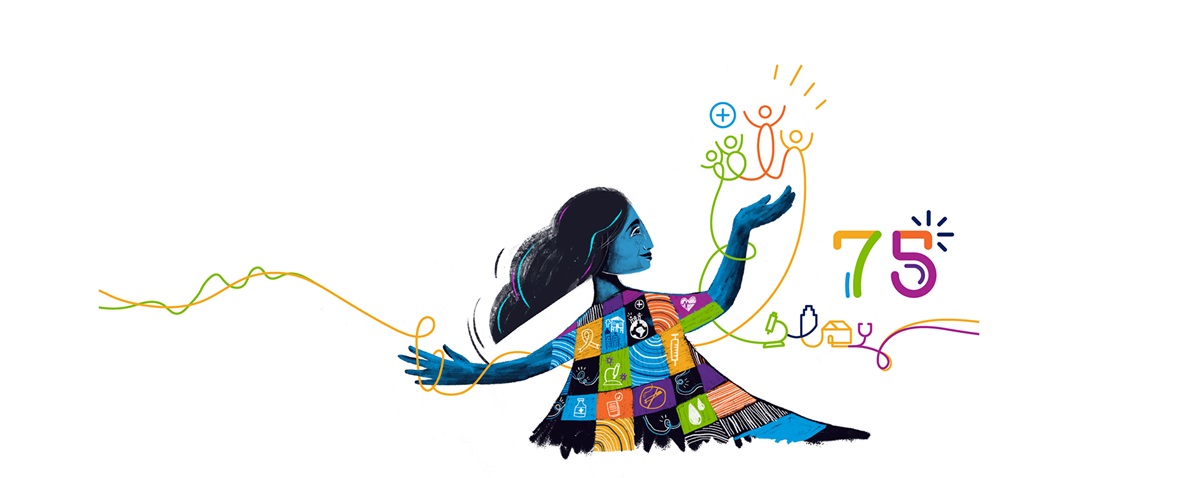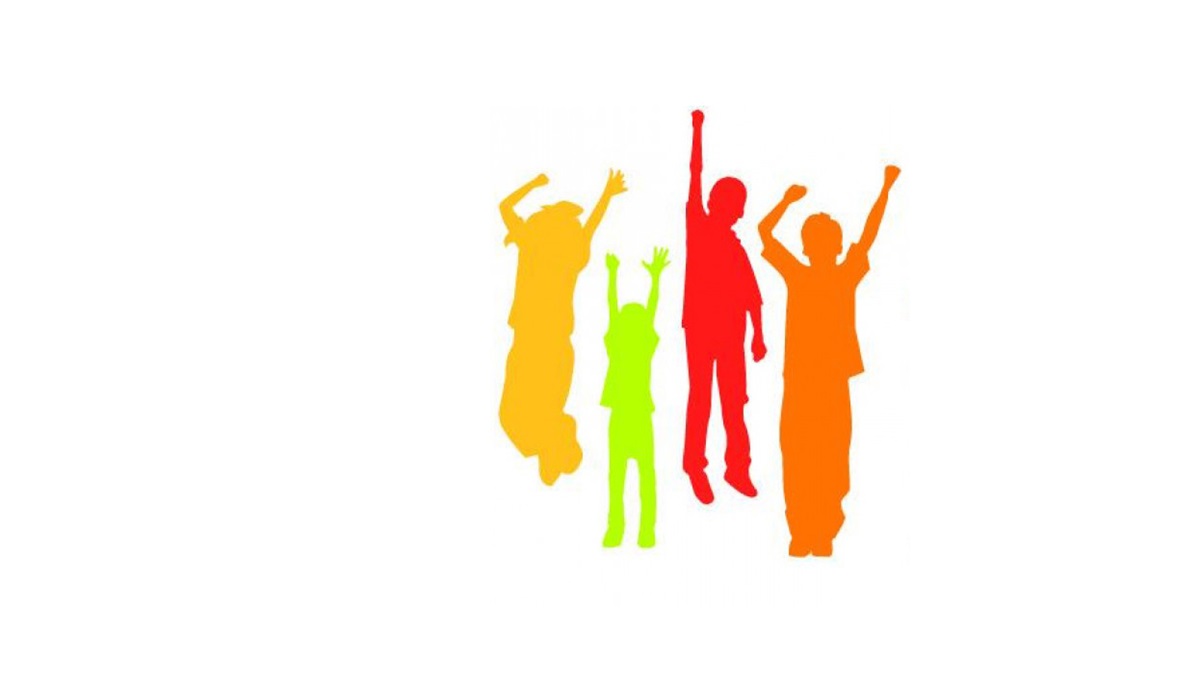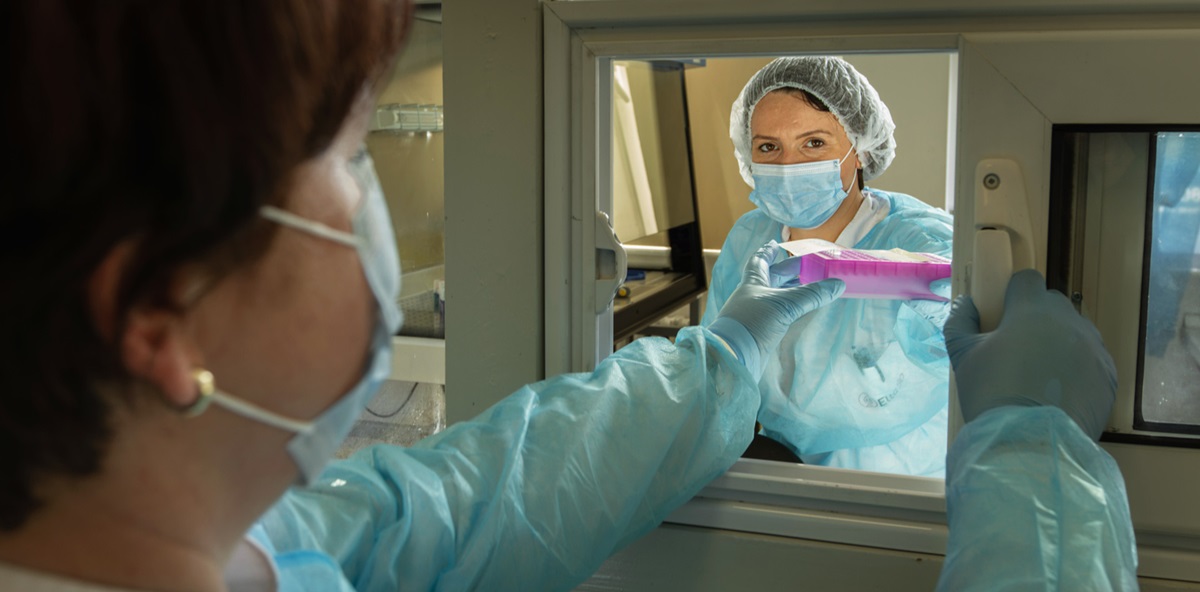No images? Click here
Longer, healthier lives for all: WHO at 75
04-04-2023
The World Health Organization was founded in 1948, based on the principle that everyone has the right to the highest attainable standard of health, regardless of their race, religion, political belief, or economic or social condition. This year, starting on 7 April, World Health Day, we celebrate 75 years of continuous work dedicated to improving human health. Over this time, we have made extraordinary advances in public health: average life expectancy across the WHO European Region’s 53 Member States in Europe and central Asia has increased by 16 years. Scientific discoveries, medical developments and global health agreements have changed our world. We have developed and rolled out vaccines against smallpox, poliomyelitis and measles, establishing the Expanded Programme on Immunization to bring lifesaving vaccines to children worldwide... Read full story
European Immunization Week 2023
23 – 29 April 2023
The WHO European Region celebrates European Immunization Week (EIW) to raise awareness of the importance of immunization in preventing diseases and protecting life. This year’s campaign will work to improve vaccine uptake in the context of a global backslide in vaccination rates due to the COVID-19 pandemic.
TÜRKIYE AND SYRIA EARTHQUAKES
New life, new hope: exceptional people making a difference in Türkiye
12-04-2023
Over the last 2 months, medics from more than 20 countries have come together to support those affected by the recent devastating earthquakes, responding to a request for international assistance issued by the Turkish authorities. Working side by side with Turkish Ministry of Health staff and WHO, these remarkable individuals have played a vital role in Emergency Medical Teams (EMTs), saving lives and providing health care to those who survived the quakes.
UKRAINE EMERGENCY
Public health and immunization efforts in Ukraine bolstered by WHO amid the war
11-04-2023
Development of Ukraine’s public health system and efforts to strengthen the national immunization programme were at the centre of a 3-day WHO-led event in Kyiv that brought together health authorities and experts in public health and immunization from across the country. Together they sought ways to address new public health challenges introduced by the war. WHO convened the joint retreat along with the Ministry of Health, the Ukrainian Public Health Centre (UPHC), and regional centres for diseases control and prevention (CDCs).
Safeguarding the rights of deaf people in Ukraine
12-04-2023
Overcoming barriers to accessing rehabilitation in Ukraine amidst conflict
05-04-2023
Strengthening infectious disease control in Ukraine
04-04-2023
WHO in Ukraine holds first primary health care conference since the beginning of war
29-03-2023
WHO, with EU support, donates vehicles to strengthen vaccination efforts in Ukraine
28-03-2023
MPOX (MONKEYPOX) OUTBREAK
WHO's Science in 5: mpox update - 24 March 2023
24-03-2023
Multi-country outbreak of mpox, External situation report - 30 March 2023
30-03-2023
COVID-19
SAGE updates COVID-19 vaccination guidance
28-03-2023
Increasing Recognition, Research and Rehabilitation for Post COVID-19 Condition (long COVID)
Publications and technical guidance
Publications, country and technical guidance for the COVID-19 outbreak

11-04-2023
WHO/Europe, the Eastern Europe and Central Asia Regional Office of the United States Centers for Disease Control and Prevention (CDC), and the University of Washington’s International Training and Education Center for Health (I-TECH) have launched the Informatics and Data Science for Health (IDASH) fellowship in countries of eastern Europe and central Asia to improve public health informatics and data science practices.
Through this powerful collaboration, WHO/Europe aims to support countries to better govern digital transformation in the health sector and advance digital health literacy – key objectives of the Digital Health Action Plan for the WHO European Region 2023–2030. Adopted by all 53 countries of the Region, the Action Plan serves as a roadmap to improve people’s health and well-being through digital technologies.
Combatting NCDs and promoting mental health: strong partnership is key
30-03-2023
Unfinished business: the challenge of ending tuberculosis in the European Region
24-03-2023

REGIONAL DIRECTOR
24-03-2023
Friends, colleagues, partners, greetings from the WHO European Region – covering 53 countries across Europe and central Asia – a region where ending tuberculosis remains unfinished business, yet a region that has the know-how to end TB. 141 years ago, on 24 March 1882, Robert Koch identified Mycobacterium tuberculosis as the causal agent of a disease at the time considered incurable.
Looking back from where we stand today, 24 March 2023, World TB Day, we have made huge strides in tackling this preventable and, yes, curable disease – including the social and economic factors linked to TB. We should be well-poised to end TB by 2035, given that we have long had the ability to diagnose and treat it, and to prevent its spread. But the current reality is different.
It’s been 5 years since the first UN High-Level Meeting on TB. From it appeared ambitious targets that were supposed to have been achieved last year. Progress, however, has been dismal – for many reasons. Numerous crises arriving faster than ever before – natural disasters, conflicts, COVID-19 – all have contributed to severely impacting health systems, jeopardizing gains made, including combating multidrug-resistant TB and TB–HIV coinfection. Read the full article

05-04-2023
Since the beginning of the COVID-19 pandemic, WHO has supported public health laboratories in North Macedonia, building their capacity and preparedness to detect and respond to health threats. Efficient laboratory systems mean successful detection, characterization and tracking of disease transmission. This involves training laboratory specialists, introducing and implementing quality standards, and providing up-to-date equipment and supplies. “The COVID-19 pandemic made it hard for health care systems across the world to cope. Finding out what caused the disease was essential to prevent, detect and diagnose it. Public health laboratories played a crucial role in this,” said Dr Anne Johansen, WHO Special Representative to North Macedonia.
WHO helps Uzbekistan to strengthen rehabilitation services and assistive technology
05-04-2023
WHO advocates for patient safety and quality of care in North Macedonia
04-04-2023
Cases of iatrogenic botulism in individuals who underwent treatment for obesity in Türkiye
24-03-2023
Towards collaboration on medicines among members of the Small Countries Initiative
24-03-2023

EVENTS
Advancing equity in digital health: challenges and opportunities
17 April 2023 14:00–15:00 CEST (virtual)
Launch of the European Region summary of the Global oral health status report: towards universal health coverage for oral health by 2030
20 April 2023 09:00 – 10:30 CET UN City, Copenhagen (webinar)
Health systems policy dialogue to strengthen mental health in the central Asian republics
25 – 26 April 2023 Tashkent, Uzbekistan
Immunization Programme Managers’ Meeting
3 – 4 May 2023, Izmir, Türkiye
WHO Partners Forum 2023
13–14 June 2023, Istanbul, Türkiye
Seventh Ministerial Conference on Environment and Health
5 – 7 July 2023, Budapest, Hungary









